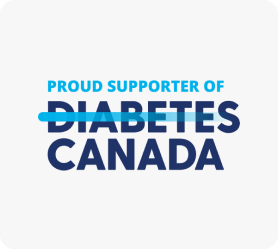

This year, LifeLabs is partnering with Diabetes Canada for Diabetes Awareness Month.
For every kit sold, we’ll donate $10 to improve diabetes awareness and education. Join us in making a difference—get yourself tested and help raise diabetes awareness!
Diabetes Canada does not endorse any Life Labs products and does not make any claims about their efficacy or health benefits. Diabetes Canada is a recipient of sponsorship money raised through the sales of this Life Labs product in 2024. LifeLabs will donate $10 per test kit for the first 1,000 blood test kits to Diabetes Canada in support of their mission to improve the lives of Canadians with diabetes.
Effortless, accurate, and personalized care
Order the test from the comfort of your home. No visit to your healthcare provider required. With an easy-to-use kit, you can collect your sample when and where it works best for you. Take control of your health effortlessly with our all-in-one testing service.
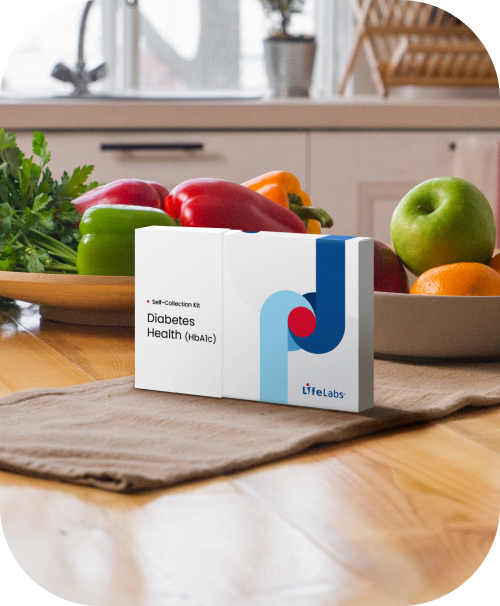
Diabetes Health (HbA1c) Kit$65.00
- Easy to Order, Easy to Use
Save time by ordering the test from the comfort of your home. With an easy-to-use kit, you can collect your sample when it’s convenient, and mail it to our lab for precise results.
- Immediate, Secure Results & Virtual Follow Ups
Access your results online as soon as they are ready using our secure results portal. Virtual appointments with qualified physicians are scheduled in case of abnormal test results, giving you personalized follow-up with a healthcare provider.
- Actionable Insights for Real Improvements
Those with high HbA1c levels can join LifeStyle Rx's OHIP-covered 12-week diabetes coaching program. An impressive 91% of participants improve their HbA1c, with 44% of people achieving levels below 6.5%.
Do you have a valid health card?
The cost of this product reflects the cost of the test with OHIP coverage. At checkout, please enter a valid health card information and answer all assessment questions in order to confirm you qualify for the discounted price.
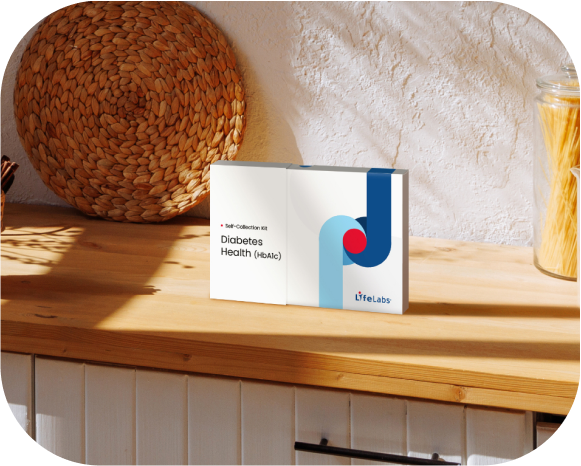
Diabetes Health (HbA1c) Kit
Accessible, convenient, and comfortable testing
Accessible, convenient, and comfortable testing
This at-home collection kit offers a quick, easy, and convenient way to order your kit and collect your sample from the comfort and privacy of your home. You will have six months to use your kit. When you send your blood sample to LifeLabs, your HbA1c levels will be tested. Your results will be available online and a healthcare provider from LifeLabs clinical partner MD Connected will contact you if your HbA1c levels are out of normal range.
What is an HbA1c test?
An HbA1c (glycated Haemoglobin) test measures the amount of blood sugar (glucose) attached to hemoglobin. Hemoglobin is the part of your red blood cells that carries oxygen from your lungs to the rest of your body. An HbA1c test shows what the average amount of glucose attached to hemoglobin has been over the past six to eight weeks. It’s a three-month average because that’s typically how long a red blood cell lives.
If your HbA1c levels are high, it may be a sign of diabetes. Diabetes can cause permanent damage to your organs and lead to strokes, heart attacks, kidney failure, leg and foot amputations, and blindness.
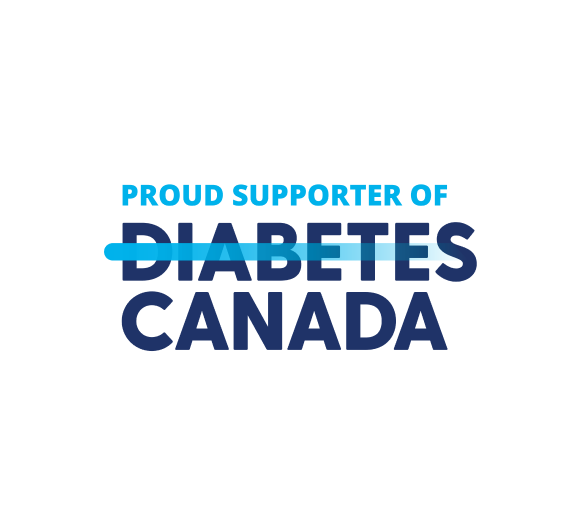
Why is HbA1c testing important?
Thirty percent of Canadians (over 11.7 million) are living with diabetes or prediabetes and 5% have undiagnosed type 2 diabetes. Diabetes Canada statistics continue to show a rising trend of diabetes rates across Canada.
Early detection, monitoring and treatment of diabetes can help prevent permanent damage to the heart, kidneys, eyes, nerves, blood vessels, and other vital organs and reduce the chances of serious health problems like heart attacks, strokes, kidney failure, and leg and foot amputations.
*Diabetes Canada does not endorse any Life Labs products and does not make any claims about their efficacy or health benefits. Diabetes Canada is a recipient of sponsorship money raised through the sales of this Life Labs product in 2024.Who should get tested?
You can develop type 2 Diabetes at any age, even during childhood. However, type 2 diabetes occurs most often in middle-aged and older people. Many risk factors affect your likelihood to develop type 2 diabetes, including:
- being over the age of 40
- having a parent, brother, or sister with diabetes
- being of African, Arab, Asian, Hispanic, Indigenous, or South Asian descent
- having high blood pressure
- having high levels of cholesterol or other fats in the blood
- having a high BMI (or being overweight)
- having Polycystic Ovary Syndrome (PCOS)
- having a psychiatric disorder (schizophrenia, depression, bipolar disorder)
- having obstructive sleep apnea
- having darkened patches of skin called acanthosis nigricans
- taking a glucocorticoid medication
Adults ages 18+ can get tested for HbA1c using the LifeLabs Diabetes Health (HbA1c) Kit.

Order a kit today
The Diabetes Health (HbA1c) kit is a quick and easy way to collect your sample from the comfort and privacy of your home.
Frequently Asked Questions
-
Type 2 diabetes is a condition that happens because of a problem in the way the body regulates and uses sugar as a fuel.
When you have type 2 diabetes, either your body can’t make enough insulin or it doesn’t use insulin properly. Insulin is a hormone that helps control the amount of sugar in your blood. Type 2 diabetes is associated with many risk factors, and it makes up 90% of all diabetes cases in Canada.
-
You can develop type 2 diabetes without showing any symptoms, and your chances of developing diabetes are affected by many risk factors. If you think you might be at risk, take action. Early detection and management are crucial to reduce the risk of diabetes complications.
The most common type 2 diabetes symptoms can include:
- unusual thirst
- frequent urination
- weight change (gain or loss)
- extreme fatigue or lack of energy
- blurred vision
- frequent or recurring infections
- cuts and bruises that are slow to heal
- tingling or numbness in the hands or feet
- trouble getting or maintaining an erection
- diabetes ketoacidosis (DKA)
To conduct a full screening, visit the Public Health Agency of Canada’s Canadian diabetes risk questionnaire.
-
For those with OHIP coverage, our HbA1c test is just $65, including everything needed for effortless home collection.
- Innovative Collection Device: Simple and precise sample collection.
- Free Shipping: Fast and secure delivery of your kit.
- On Demand Customer Support: Assistance when you need it.
- Online Guidance: Step-by-step videos and instructions.
- Virtual Healthcare Provider: An online provider to sign your request form and follow up on your results.
- Diabetes Reversal Program: Access to an online publicly covered program.
- Online Results: Conveniently view your results online.
-
It is recommended that you drink plenty of fluids the day before collecting your sample.
An HbA1c test shows what the average amount of glucose attached to hemoglobin has been over the past six to eight weeks. The food you have recently eaten does not affect the HbA1c test, so you do not need to fast to prepare for this blood test.
-
Conditions that may affect the accuracy of an HbA1c result include: anemia, cystic fibrosis, hemoglobin or red blood cell abnormality (e.g., sickle cell anemia or thalassemia), chronic kidney disease, or liver disease.
-
Your sample will be collected at home onto a dried blood spot card. To learn more about the process please visit our online instructions page.
-
HbA1c gives a long-term (3 months) overview of blood sugar control, reflecting average levels over several months. Random glucose monitoring provides a snapshot of blood sugar levels at a specific moment, and is used for immediate and short-term diabetes management.
-
People living with diabetes should have their HbA1c measured every 3 months when their blood glucose targets are not being met or when they are making changes to their diabetes management.
If you have risk factors that increase the likelihood of developing type 2 diabetes, regular screening at least every three years is recommended.
Risk factors include:
- being over the age of 40
- having a parent, brother, or sister with diabetes
- being of African, Arab, Asian, Hispanic, Indigenous, or South Asian descent
- having high blood pressure
- having high levels of cholesterol or other fats in the blood
- having a high BMI (or being overweight)
- having Polycystic Ovary Syndrome (PCOS)
- having a psychiatric disorder (schizophrenia, depression, bipolar disorder)
- having obstructive sleep apnea
- having darkened patches of skin called acanthosis nigricans
- taking glucocorticoid medication
-
You can schedule an appointment with your regular primary care provider, such as your family doctor, to discuss HbA1c testing. Once your primary care provider has signed your request form, simply take it to your nearest LifeLabs location for sample collection.
-
Your results will be available online through our secure platform. A notification will be sent to your inbox when your results are ready.
If you have a normal result and have questions, you will have the option to discuss your result with LifeLabs’ clinical partner MD Connected.
If you have an out of range result (low, prediabetic or diabetic result), a healthcare provider from LifeLabs clinical partner MD Connected will contact you within 2 business days.
-
As HbA1c levels increase, the risk for diabetes increases. The American Diabetes Association defines prediabetes as a HbA1c between 5.7-6.4% while Diabetes Canada defines it as 6.0-6.4%. The cutoff applied depends on where testing was performed.
-
All at-home collection request forms expire within 6 months of being e-signed by a healthcare provider. Be sure to complete the test prior to the request form expiring.
All at-home collection kits are final sale, and your sample must be returned to LifeLabs within 6 months of purchase and two days of collection.


 Return to collection guide
Return to collection guide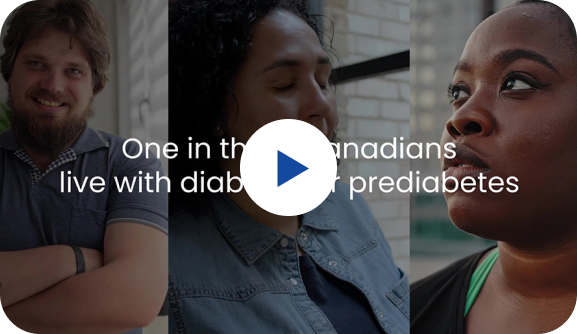

 Use our contact form to send us an email.
Use our contact form to send us an email. Still not sure? Give us a call and we can help.
Still not sure? Give us a call and we can help.